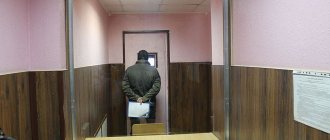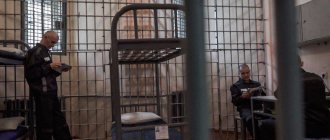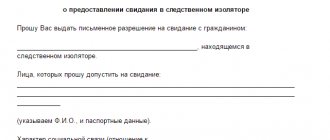A person in a pre-trial detention center has the right to meetings with a lawyer (without restrictions in number) and meetings with loved ones (twice a month). But an important condition is that before the meeting you must submit a request and obtain permission from the judge, investigator or head of the detention center.
The peculiarity of visits in a pre-trial detention center is that they can only be short-term, no more than 3 hours. This is regulated by Federal Law No. 103-FZ “On the detention of suspects and accused of committing crimes.” Are long-term ones allowed? Long meetings are permitted only after the verdict has been announced and the defendant has been transferred to a correctional colony.
Who are they allowed in?
Visits can be held from the first day of actual detention. Who is entitled to meetings according to the law? The following may come to the pre-trial detention center:
- lawyers handling the defendant's case;
- notaries to prepare documents necessary in court;
- family members of the prisoner and people who are not related to him by blood.
Attention . Unfortunately, there are common cases when people who are not relatives of the person being held in the pre-trial detention center (for example, colleagues or cohabitants who are not officially married) are not allowed to attend meetings. Please be aware that this is a direct violation of rights.
So how can you get to a meeting in a pre-trial detention center if you are not a relative? Article 18 of Federal Law No. 103-FZ “On the detention of suspects and accused of committing crimes” clearly states: “Suspects and accused, on the basis of the written permission of the person or body in charge of the criminal case, may be granted no more than two visits per month with relatives and other persons.”
Consequently, any refusal based only on the lack of confirmation of kinship can be appealed to a higher authority (through the Prosecutor General's Office, the Federal Penitentiary Service, etc.).
There is no law prohibiting meetings with minors . For example, a wife can take her young child on a visit with her detained husband (the situation is complicated only by the fact that for each visitor, including small ones, a request must be submitted separately).
Children and adolescents under 18 years of age are prohibited from visiting a pre-trial detention center alone; the presence of an accompanying adult is mandatory.
Other features depending on the conditions of detention and the regime of the place of serving the sentence
General Features Applicable to All Modes:
- At the request of the convicted person, visits may be replaced by telephone conversations.
- Anyone arriving on a date must be sober and not under the influence of drugs.
- If the convicted person is in a punishment cell, then he is not allowed to visit.
- The introduction of medical quarantine in an institution is another reason to prohibit visits.
Let's consider other features depending on the MLS mode and content.
Colony settlement
In penal colonies, people are held for crimes of minor and medium gravity, as well as for unintentional offenses. The regime here is soft, so convicts have the opportunity to move freely around the camp and even, with the permission of the administration, leave its boundaries. As mentioned above, there are no restrictions on visits with family in a colony settlement .
Inmates in this correctional facility are not considered dangerous criminals, so they are allowed to lead a more normal lifestyle. If you wish, you can try to apply for a visit outside the colony. Most often, such meetings are approved by mothers.
We talked about the rules for serving sentences and the rules of visits in colony settlements in this material.
General regime colony
General regime colonies are the most numerous in Russia . The reason for this is the wide range of articles under which citizens who have violated the law end up in these institutions. In addition to the visits required by law, in a general regime colony, as an incentive measure, convicts can receive up to 2 additional visits with their child on holidays or weekends. This condition is valid under normal conditions.
In simplified conditions, it is possible to get an unlimited number of visits with a minor child on holidays and weekends. Basically, this privilege goes to single mothers who have proven themselves to be good.
You can find out more about the conditions of detention of convicts in general regime colonies here.
Maximum security colony
Only men are kept in maximum security colonies . Women convicted of especially serious crimes serve their sentences either in general regime correctional institutions or in women's prisons. You can increase your small number of short-term dates through hard work and exemplary behavior.
According to the law, a convicted person placed in a high-security correctional colony must serve 9 months under general conditions before he can be transferred to lighter conditions with the addition of an additional visit.
We talk about the rules of detention and conditions of stay in institutions with strict security in a special article.
Special regime colony
Only men are kept in a special regime. It is most difficult for prisoners in such colonies to receive additional visits and other concessions. It is especially difficult for those sentenced to life . But in general, there are no special differences.
You can learn about the features of serving a sentence under a special regime here.
How many meetings are there and what is their duration?
A lawyer can hold conversations with his client at least every day - there are no restrictions on the number of meetings, meetings are limited only by duration (up to 3 hours).
As for visits to the pre-trial detention center by close people (relatives and friends), there is a strict limitation of up to 2 times a month (clause 139 of the Internal Regulations of the pre-trial detention center, order of the Ministry of Justice No. 189 of October 14, 2005). The maximum duration of one date is 3 hours .
As we already wrote at the very beginning, in the introduction, there are no long visits in a pre-trial detention center!
Is it possible to transfer something?
During one visit to the pre-trial detention center, you can settle several matters: talk with the prisoner, arrange the transfer and deposit money into the prisoner’s account.
The following are permitted for transfer (the list may be slightly adjusted depending on the procedures in a particular pre-trial detention center):
- toothbrush and toothpaste;
- underpants and socks;
- laundry soap and shampoo;
- cigarettes;
- tea and coffee;
- instant food and canned food (no more than 2 cans);
- salt and sugar;
- sweets without wrappers and cookies (no more than 2 kg);
- fruits and vegetables that can be eaten raw (for example, onions, garlic, tomatoes, cucumbers);
- bakery products;
- juices in transparent packages.
Things and products are not passed from hand to hand during a meeting, but through inspectors who inspect the goods and reject those that seem dubious to them. The prisoner receives the parcel within 1-2 days after the transfer is completed.
According to Article 25 of Federal Law No. 103-FZ “On the detention of suspects and accused of committing crimes,” a pre-trial detention center prisoner can receive parcels with a weight limit of no more than 30 kilograms per month. The parcel is handed over to the suspect or accused no later than one day after their receipt.
For reference : meat products such as boiled sausage, lard, sausages are not on the list of prohibited items, but most often they are not accepted. The reason is safety - pre-trial detention center workers are not responsible for the storage conditions of food (meat can spoil and cause poisoning).
The transfer is strictly prohibited:
- alcohol;
- any type of weapon;
- drugs;
- phones and SIM cards (read more about whether you can use a phone in a pre-trial detention center here);
- materials related to the criminal case;
- pornographic products;
- explosives.
If attempts are detected to smuggle the listed products to prisoners, the visitor to the pre-trial detention center will be held administratively or criminally liable.
From the video below you can learn how to collect a parcel in a pre-trial detention center, what to put in it:
For those who find themselves in a pre-trial detention center for the first time, it is important to know how to behave for the first time and how the time in a pre-trial detention center is counted towards the total term of imprisonment.
What are you allowed to take with you?
You can take with you to a meeting only what is not included in the list of prohibited items. Another thing is that the guest should not have any physical contact with the prisoner . Given this, it is better not to provoke correctional officers and not to take any objects into the visiting room at all. It is better to leave your wallet, phone and bag at the checkpoint against a signature.
List of prohibited things:
- alcohol, drugs, tobacco products;
- cell phones, tablets, laptops and other means of communication;
- money and other valuables;
- Food;
- weapon.
The visitor is obliged to hand over prohibited items to the junior inspector in accordance with paragraph 76 of the extract from Order No. 295 of the Ministry of Justice of the Russian Federation. No one forbids taking printed photographs into the room for short-term visits and showing them to the prisoner. This must be done without violating the rules of the correctional institution and after warning the observer, who will probably want to inspect them.
How are they going?
For holding meetings, two types of halls are equipped in the pre-trial detention center . The first is for investigative and legal conversations. Their peculiarity is their small size and the ability to ensure the confidentiality of conversations (supervisors can only observe, but not eavesdrop). The conversation takes place directly, without a dividing partition or telephone.
For short-term meetings with relatives and friends, there is a hall with booths fenced off from each other. Communication with prisoners occurs through a partition made of transparent polymer material that is shock-resistant. In some pre-trial detention centers, in addition to a partition between those talking, there are also bars and a corridor about a meter wide, along which the guard moves. The conversation is carried out through a telephone.
Is security watching?
The procedure for the security service during visits is regulated by Chapter 16 of the “Internal Regulations of Pre-trial Detention Facilities of the Penitentiary System” (approved by Order of the Ministry of Justice of the Russian Federation dated October 14, 2005 N 189):
- During meetings with lawyers, the pre-trial detention center officer can see the prisoner and his defense lawyer, but not hear their conversations.
- When meeting with relatives and friends, security has the right to conduct visual surveillance of the arrested person and his guests, as well as listen to the entire conversation.
When monitoring meetings with a lawyer, only a picture from a video camera is used ; security guards have no right to be present in the room. When a prisoner meets with relatives and friends, the guards must be nearby, in the same room.
How many dates are allowed?
The number of short-term visits, as opposed to their duration, directly depends on the prisoner’s detention regime. The more serious the crime committed, and therefore the regime of detention of the perpetrator, the fewer visits he can receive during the year.
In this case, the behavior of the prisoner himself plays an important role. For those who fulfill the requirements of the administration of the penal colony, as an incentive, the number of visits can be increased within the limits established by law. For violators, the number of visits will be reduced as a disciplinary sanction.
Order of the Ministry of Justice of the Russian Federation No. 295 clearly prohibits dividing the time of one date into several or, conversely, combining several dates into one to increase its duration.
Currently, the following restrictions on the number of short-term visits apply:
- For the general regime: in normal and light conditions - 6 dates per year, in strict conditions - 3 dates.
- For a strict regime: 3 dates under normal conditions, 4 under light conditions and 2 under strict conditions.
- For a special regime: in normal and strict conditions - 2 visits, in light conditions - 3.
These restrictions are regulated by Articles 121, 123 and 125 of the Penal Code of the Russian Federation.
For prisoners serving their sentences in a colony-settlement, there are no restrictions on short-term visits at all (according to Article 129 of the Penal Code of the Russian Federation).
Article 89 of the Penal Code of the Russian Federation allows prisoners to exchange a long-term visit for several short-term ones. But reverse exchange is prohibited.
The law also requires that dates be distributed evenly throughout the year. For example, if a convicted person is entitled to 4 visits per year, then the intervals between them should be 3 months.
The only reason for an unscheduled visit is a serious illness of the convicted person, threatening his life. In this case, relatives can visit him outside of the visiting schedule. This meeting will not be counted towards the total number of short-term dates.
In what cases can they interrupt?
Remand prison workers have the right to prematurely stop a meeting between a prisoner and his visitors, but there must be compelling reasons for this. According to paragraph 147 of Chapter 16 of the “Internal Regulations of Pre-trial Detention Facilities of the Penitentiary System,” a visit can be interrupted if:
- The prisoner or his visitor shows signs of aggression (screaming, trying to damage the property of the detention center, etc.).
- The fact of illegal transfer of any items or food products to a prisoner was recorded.
- Pressure is exerted on the prisoner or if the prisoner tells his relatives any information related to the criminal case (that’s why all conversations are wiretapped).
- The visitor violates the rules of conduct (for example, tries to smoke in the meeting room or tries to communicate with prisoners from neighboring booths, etc.).
When holding short-term meetings in a pre-trial detention center, it is allowed to speak only Russian . You cannot bring technical communications equipment, computers, photo, audio, or video equipment into the visiting room.
Attention : even if you have a permit document, a person may not be allowed to have a meeting in a pre-trial detention center if he shows up for a meeting drunk, does not provide identification, refuses to be searched, or behaves inappropriately (swearing, getting into an argument or fight with prison staff or other visitors) .
Visits may also be prohibited if a quarantine has been declared in the pre-trial detention center or a regime of special conditions has been introduced.
How to get permission?
How to get to a meeting in a pre-trial detention center? The first thing to do is fill out and submit permit applications. It can be written by hand or printed on a computer.
The application must be drawn up strictly in the prescribed form , otherwise it will not be accepted as an official document.
Currently the following template is considered valid:
- In the upper right corner, indicate the addressee (in the next paragraph we will tell you to whom exactly you need to send your request) (his position, title, full last name, first and patronymic abbreviated) and the applicant (full full name, residential address, passport series and number).
- By . From a red line across the entire width of the sheet - a request for a meeting with the prisoner, indicating the degree of relationship, his full name (in full) and year of birth.
- At the bottom left is the date, month and year of writing the appeal.
- Below on the right is the applicant’s last name, first name and patronymic and handwritten signature.
A judge, head of a pre-trial detention center or investigator has the right to consider a request for a visit to a pre-trial detention center within two weeks from the date of filing the request.
Submitting it through a lawyer will significantly reduce the time it takes to consider an application (in this case, you can expect to receive permission within a couple of days).
If the application is accepted and the visit is permitted, the applicant is issued a ticket addressed to the head of the pretrial detention center. The right to a one-time visit to a pre-trial detention center extends to two weeks from the date that will be indicated at the bottom of the document. If after 14 days the right to visit is not used, the request will have to be submitted again.
Along with the application and permission, you must go to the pre-trial detention center. Please note that visits are carried out according to a schedule . As a rule, this is Monday, Tuesday, Wednesday, Thursday from 9.00 to 18.00 (applications are accepted only in the first half of the day).
Next, you can watch a video about how to get permission to visit in a pre-trial detention center with a high probability:
Meeting in a pre-trial detention center. Recommendations for relatives
If you want to meet with the prisoner as quickly as possible and without unnecessary hassle, you should know that applications for a meeting are usually accepted in such institutions from 10.00 to 12.00 hours. It is also worth understanding that there are queues, so you should hurry. Usually people arrive from the very early morning in order to have time to simply submit an application.
When you go on a date, it's best to do several things at once. For example, in one visit you can not only make a transfer for an arrested person, but also send money to his personal account. Along with this, you can also send a letter, which the prisoner should receive on the same day. Food and other items can also be handed over through the prison (isolation) kiosk, for which a certain payment is taken.
You won't be able to give everything to a prisoner. Please note that tea, both black and green, may not be accepted. Therefore, buy inexpensive medium-leaf tea. As for cigarettes, they can be transferred in strictly limited quantities.
If there is a need to donate food, then it is most advisable to buy, for example, instant noodles, cereals, mashed potatoes, that is, something that can be cooked using a boiler. It is also allowed to transfer vegetable and butter oil, canned meat and fish, but no more than two cans.
You can transfer vegetables and fruits with the exception of citrus fruits. After all, such fruits are often used to transfer alcohol to the prisoner, which is pumped directly into them. Sugar can be transferred no more than 2 kilograms.
Features during investigations and after sentencing
The rules for visiting a pre-trial detention center are the same for all stages of criminal proceedings . The only difference is in whose name you need to write applications for a date:
- To the investigator before the trial, when the case is in pre-trial proceedings.
- To the judge or chairman after the case has been submitted to the court.
- To the head of the pre-trial detention center, if a sentence has been passed, but the convicted person has not yet been transferred to a penal colony.
Officials do not have the right to prohibit visits required by law only on the basis that an investigation is underway or a sentence has been passed.
In what cases can they be prohibited and what to do if they refuse?
The applicant may be denied a meeting with a person in a pre-trial detention center if the investigator or judge considers such a meeting to interfere with the criminal proceedings. The official must give reasons for his decision, and relatives and friends have the right to challenge the refusal received by filing a complaint with higher authorities. To do this, you need to perform two actions:
- Request from the person who refused the visit a written confirmation of his decision (application for such a document can be made in person or by registered letter).
- Send the confirmation of refusal received to the higher authority along with your statement of request to reconsider this ban. The application can be submitted on behalf of a visitor who has been banned from visiting, or on behalf of the lawyer of a person in a pre-trial detention center.
If the investigator or judge refused to give reasons and issue written confirmation of their refusal, then you must declare a violation of your rights.
To do this, write a complaint, which should contain the following information:
- Information about the applicant (full name, registration address, passport details) and about the person under investigation with whom you need to attend a meeting in the pre-trial detention center (full name, address of the pre-trial detention center).
- Description of gross violations of the persons who should have issued permission for the meeting (indicate the date of filing the application, write your opinion about the groundlessness of the refusal, describe the unlawful actions of officials who impede the meeting).
A complaint can be sent to any of the following authorities:
- Federal Penitentiary Service of Russia for the region where the pre-trial detention center is located.
- Federal Penitentiary Service of the Russian Federation.
- Prosecutor's Office for Supervision of Compliance with Laws.
- Commissioner for Human Rights in the Russian Federation.
- Interstate bodies for the protection of human rights.
- The Constitutional Court of the Russian Federation on checking the constitutionality of the law.
How to correctly write an application for a short-term visit?
To receive a visit, you must fill out the application correctly. The algorithm of actions should be like this:
- Submit an application addressed to the head of the correctional institution.
- Receive a signed permit. As a rule, it is issued on the spot, and an official seal must be affixed.
- Pay a visit to the prison.
The application form is written by hand. You should take paper and pen with you. The header states:
- the name of the authority where the prisoner is serving his sentence;
- full name, surname and patronymic of the official authorized to give consent to short-term visits;
- full name of the applicant;
- his residential address.
The title is written in the center - “Application for permission to visit a prisoner.” The petition part must consist of:
- surname, name and patronymic of the convicted person;
- his date of birth;
- information about the place where the convicted person is sitting, that is, his exact name or number;
- type of date, in this case short-term;
- a list of persons for whom a permit must be issued, as well as their passport details. If a minor goes on a date with an adult, this should be noted;
- you can indicate who the convicted applicant is, however, for a short-term visit this point is not necessary;
- expression of request.
Example: “I request written permission for a short-term meeting with Artem Ivanovich Alekseev, who is in colony settlement No. 23. Persons whom I ask to be allowed on a date: Maria Vladimirovna Alekseeva, passport 12565 01, issued by the Chita District Internal Affairs Directorate on January 28, 2005; Gruzdev Boris Nikolaevich, passport 12458 23, issued by the Department of Internal Affairs of the Chita region, December 15, 2016.
At the end of the application, the date of writing and the signature of the applicant are indicated. The permit is issued by the head of the correctional institution, his deputy or a person appointed by order of the head.
Electronic application
The application can be submitted not only in person, but also electronically . This must be done on the website of the GUFSIN of the region where the correctional institution is located. The document form is located in the section “for relatives of the convicted person.”
To date, not all prisons have fully implemented this opportunity, so you can prepare an application in writing and send it to an email address. The electronic application contains the same information as the paper application, only you additionally need to add an email address for a response.










